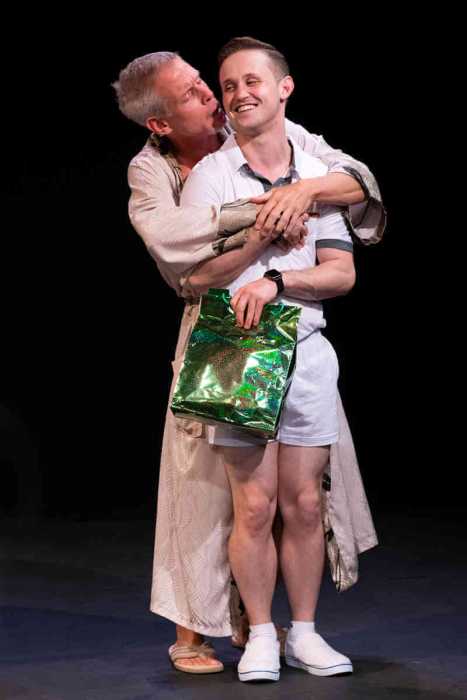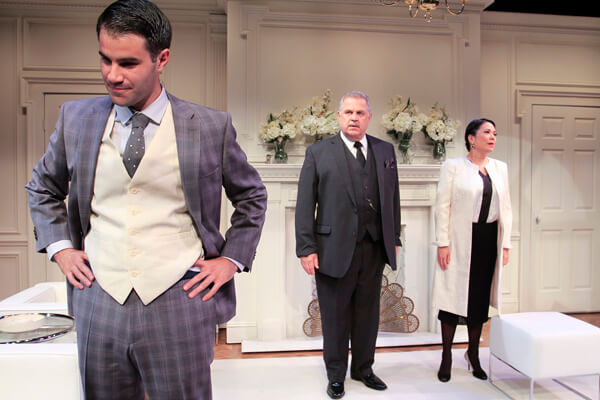If you’re looking for pure, undemanding fun on Broadway this summer, well, there’s no shortage of shows. “School of Rock” is going strong. “Head Over Heels” is pure fun, and “SpongeBob SquarePants” is inspired silliness, but you’ll want to see that soon — it closes next month.
Now comes “Gettin’ the Band Back Together.” It’s formulaic. It’s predictable. And it’s a total blast. With a book by Ken Davenport and The Grundleshotz and music and lyrics by Mark Allen, it’s overflowing with goofy charm, jokes you can see coming from a mile away, and just enough meta musical theater commentary to let the audience know this show knows exactly what it’s up to — delivering a no-holds barred good time. Add to that a wonderfully talented cast, an original score that has ‘80s and ‘90s-informed harmonic jokes, and a joyful, infectious energy. Only the most adamant curmudgeon wouldn’t give in to the fun.
The plot is the stuff of the fluffiest romantic comedy. Mitch Papadapoulus has been laid off from his Wall Street job and has to move back in with his mom in New Jersey. Soul searching ensues, though not too deep because it leads to the idea of recapturing high school’s glory days by getting his old garage band, Juggernaut — which had won a battle of the bands years before — back together. Mitch’s friends have all given up on their dreams and are stuck in dead-end jobs, so it’s an obvious solution. Juggernaut has to go up against its old nemesis, Mouthfeel, headed by Tygen Billows, who transformed his slacker high school days into a local real estate fortune. His band overcame its defeat decades before and has won ever year since. Still, that long-ago loss rankles.
There are romantic complications as Dani, Mitch’s ex, is now with Tygen, though it’s a fraught relationship. Then there’s Mitch’s mom, Sharon, who was a groupie back in the day and whose house is about to be foreclosed on by Tygen. Band newcomer Ricky Bling has his own high school issues, including a crush on Dani’s rebellious daughter. It all comes together at the final battle of the bands where Juggernaut tries to reclaim its glory.
Amazingly, it all makes sense, and as romcom trope heavy and unrealistic as it is, including a completely ridiculous deus ex machina ending, the mostly stock characters come off as charming. If you find yourself cheering for them at the end, well, that’s the intention and — like the “bend and snap” from “Legally Blonde” — it works every time.
The cast is fantastic. In particular, Sawyer Nunes as Ricky Bling plays the guitar like a madman and nails every comic bit. Ricky is a somewhat lost high school student, forced into the band by his math teacher Bart, one of the original Juggernauts. As Bart, Jay Klaitz makes a lot of jokes you’d expect from a bad math teacher, but he also has a crush on Sharon and that storyline has its own creepy-cute twist. Marilu Henner, as Sharon, is a riot. She’s not a singer, but you could believe her character inspired a classic rock song. Brandon Williams as Tygen is simply great, with moments of truly stupid hilarity. The piece’s ostensible villain, you can’t help liking him. Two other members of Juggernaut — Paul Whitty and Manu Narayan — are hilarious as older guys straining to recapture a younger guy’s game. At the center of it all is Mitchell Jarvis as Mitch, the (relatively) sane man amidst the madness. Jarivs is a great singer and adept comic and is completely charming. He delivers the show’s message — follow your dreams and don’t sell out — with a light touch.
Lillian Hellman’s follow up to “The Children’s Hour” was “Days to Come,” a family drama wrapped in a labor drama, with plenty of melodrama thrown in. It’s a difficult play that lasted only seven performances on Broadway in 1936 and has only been revived once in New York, 40 years ago. That makes it just the type of thing the Mint Theater Company likes to sink its teeth into. The current production at the Beckett Theatre under the direction of J.R. Sullivan grapples with the script’s difficulties and comes up a winner. In fact, with its themes of privilege, economic uncertainty, and morality, it is quite timely.
The plot concerns the Rodman family of fictional Collum, Ohio, where they run a brush company and live in comfort in a large house. With the factory hobbled by a labor strike, Andrew Rodman has called in strikebreakers, naively thinking that will end his troubles. But a fall-off in business has the company heavily leveraged and Rodman indebted to his lawyer, Henry Ellicott. Henry is carrying on an affair with Andrew’s restive wife, Julia, who, in the dark about the state of the business, wants to break free of the constraints of her life. When Leo Whalen, a union organizer, arrives, it sets up a conflict with strikebreaker Wilke, and a town once able to solve its own problems is suddenly at the mercy of battling outsiders.
Andrew genuinely wants to keep peace in the town he loves and for the men, like Thomas Firth, who have long worked for him. But tensions come to a head, and the life of the town is changed forever as tragedy ensues. Hellman is almost existential in her take on the fraying of a social fabric — much of it built on illusions and lies, to be sure — that had once kept the town in a kind of stasis. If this is progress, it’s not at all appealing.
The play is at its best when Hellman reaches for depth in her characters. It bogs down with an extended section about the thugs Wilke has brought in to protect the Rodmans, but we do gain insight into how the strikebreaker’s cynicism conflicts with Andrew’s more conventional morality. Julia, increasingly conscious of her own privilege, approaches Whelan, but their interaction merely points up how class disparities have blinded the Rodmans. Thomas, who was Andrew’s friend since childhood, sees his life shattered by tragedy and must give up the myths that made his life bearable. With all these broken pieces, the world of Collum will never be right again. If the play is imperfect — and it is — the moments of humanity and social criticism are compelling.
The cast does an excellent job. Though stilted language and clumsy exposition mar the first act, the characters emerge and develop in the second act. As Andrew, Larry Bull is caught between his need to rebuild his business and his love for the people. Haunted by his successful father and grandfather, he is incredulous at his wife’s infidelities and lost in a changing world. Dan Daily is powerful as Wilke, the strikebreaker, the play’s most clearly written and deeply cynical character. Chris Henry Coffey is heartbreaking as Thomas, who like Andrew, is a casualty of a changing world. As Julia, Janie Brookshire is best in her more focused scenes. Roderick Hill as Whelan, the union organizer, is outstanding, portraying the most sympathetic character in riveting fashion.
“Days to Come” never reaches the level of clarity of Hellman’s contemporary Clifford Odets, whose sympathies were decidedly with labor. Hellman bit off a lot in trying to cover so much emotional and sociological territory. Happily, the Mint has made the most of it, giving the audience something substantial to chew on.
GETTIN’ THE BAND BACK TOGETHER | Belasco Theatre, 111 W. 44th St.| Tue., Thu. at 7 p.m.; Fri.-Sat. at 8 p.m.; Wed., Sat. at 2 p.m.; Sun. at 2:30 & 7:30 p.m. | $49.50-$169.50 at telecharge.com or 212-239-6200 | Two hrs., 30 mins., with intermission
DAYS TO COME | Mint Theater at the Beckett, 410 W. 42nd St. | Through Oct. 6: Tue.-Sat. at 7:30 p.m.; Sat.-Sun. at 2 p.m. | $65 at telecharge.com or 212-239-6200 | Two hrs., with intermission






































